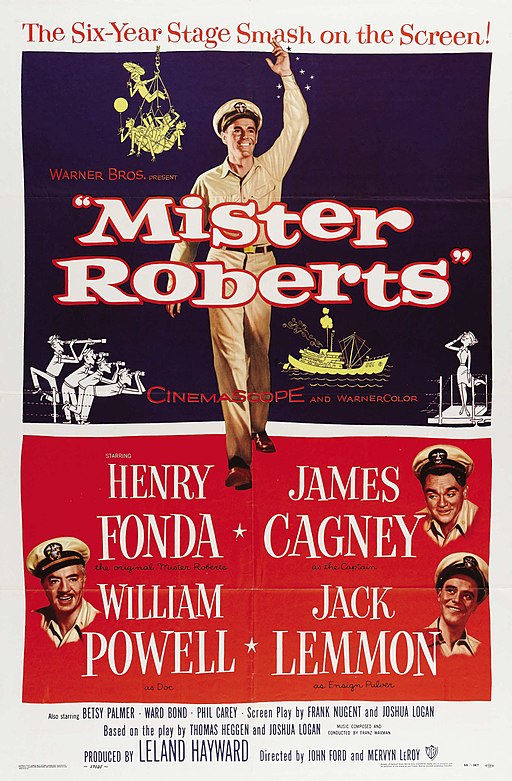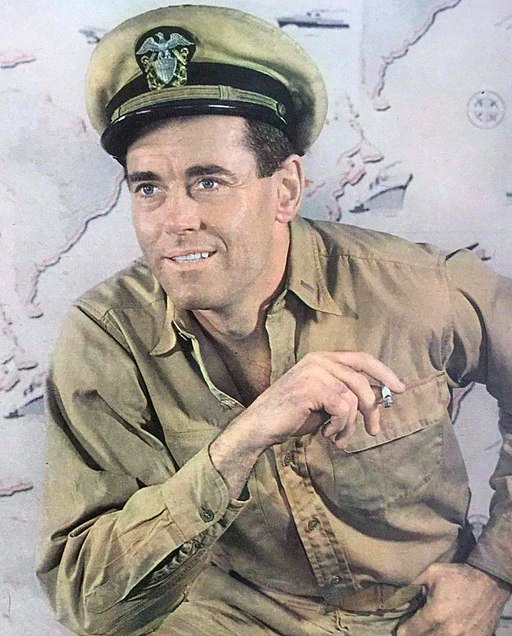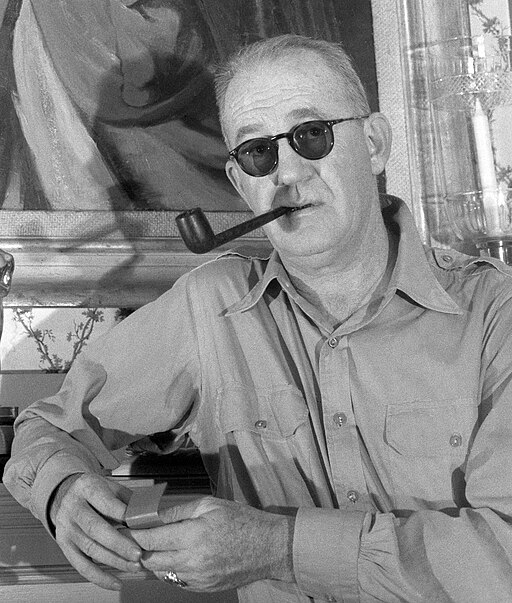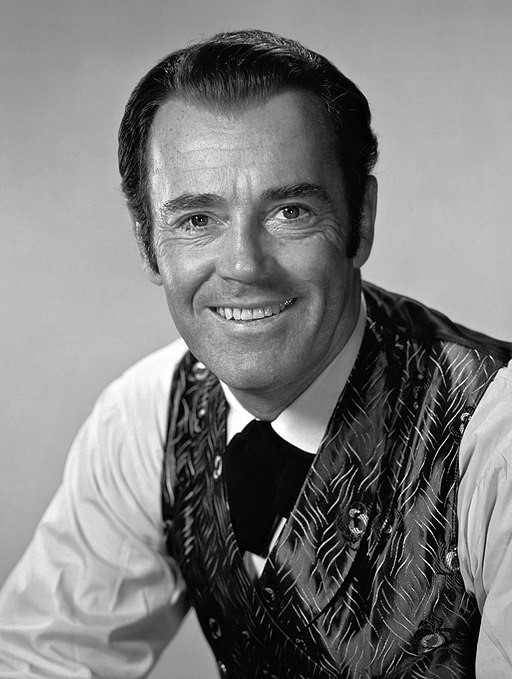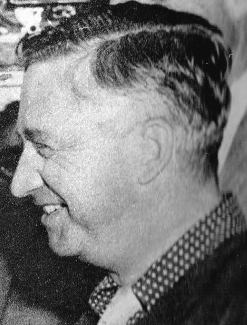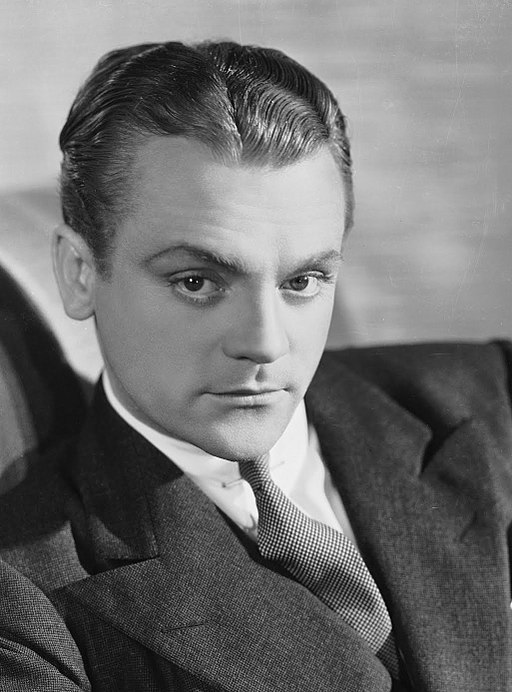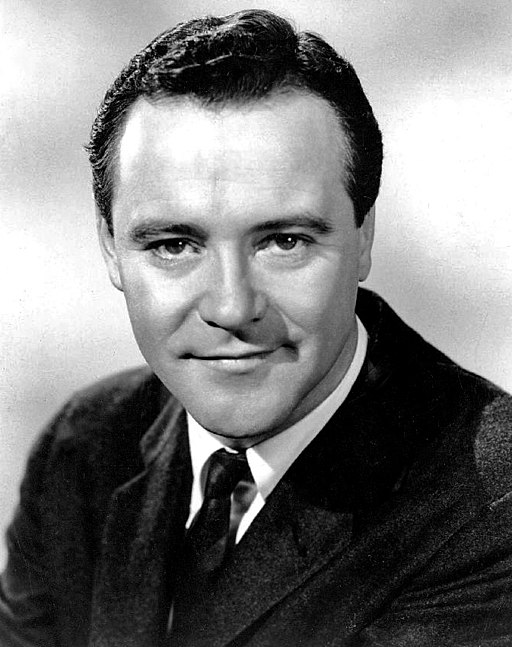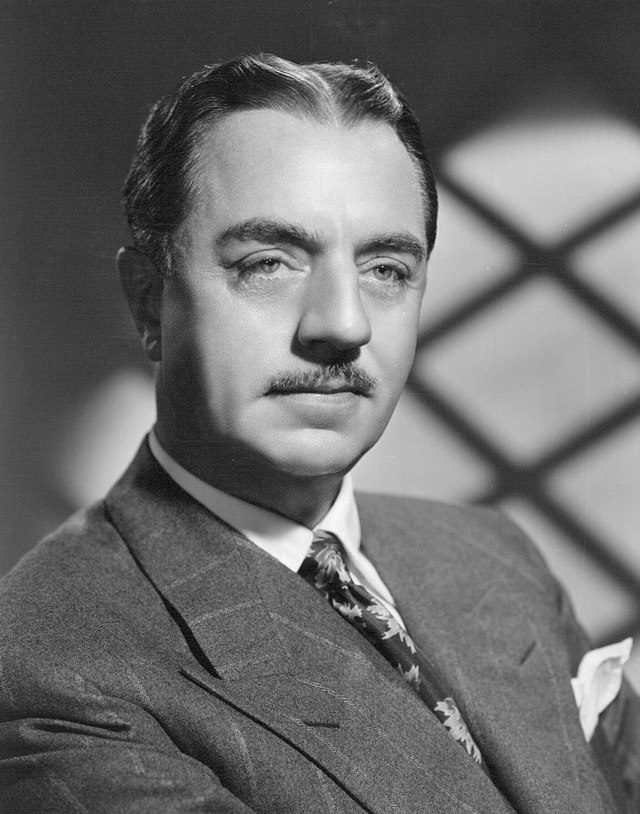Mister Roberts - 1955
back| Released by | Warner Bros. |
| Director | John Ford & Mervyn LeRoy |
| Producer | Leland Hayward |
| Script | Frank S. Nugent and Joshua Logan based on the 1946 novel |
| Cinematography | Winton C. Hoch |
| Music by | Franz Waxman |
| Running time | 123 minutes |
| Film budget | $3 million |
| Box office sales | $7 million |
| Main cast | Henry Fonda - James Cagney - William Powell - Jack Lemmon - Betsy Palmer |
Mister Roberts – 1955
A humorous portrayal of naval life and the pursuit of purpose during wartime
"Mister Roberts" is a comedy-drama film that blends elements of humor and poignancy to tell the story of a World War II naval cargo ship and its crew.
The film focuses on the titular character, Lieutenant Doug Roberts, who works on the cargo ship 'USS Reluctant' under the tyrannical Captain Morton. Roberts, desperate to see combat, deals with the frustrations of life aboard a non-combat ship, alongside his dealings with the ship's crew, including the lazy and scheming Ensign Pulver and the wise Lieutenant 'Doc.'
The film is notable for its strong performances, especially by Henry Fonda reprising his Broadway role, and a scene-stealing turn by Jack Lemmon, who won an Academy Award for his performance.
"Mister Roberts" offers a slice of naval life and the everyday struggles of the officers and sailors, balancing light-hearted moments with deeper themes of duty, sacrifice, and the longing for greater purpose during wartime.
Related
Mister Roberts
Analysis, Full Cast and Memorable Quotes
"Mister Roberts" (1955) is a poignant mix of comedy and drama that explores life aboard a U.S. Navy cargo ship during World War II. Directed initially by John Ford and later by Mervyn LeRoy, the film is a study in character dynamics, leadership, and the human condition during wartime. Here's a full analysis:
Narrative and Themes:
- Character-Driven Story: The film's narrative is driven by the interactions among its characters, primarily between Lt. Douglas Roberts (Henry Fonda), Captain Morton (James Cagney), and Ensign Pulver (Jack Lemmon).
- Search for Meaning: The central theme revolves around the search for meaning and purpose. Roberts, desperate to serve in combat and make a difference, feels stifled on the cargo ship, which is far from the front lines.
- Authority and Rebellion: The film explores themes of authority, rebellion, and morale in a wartime setting. The tyrannical Captain Morton and the more compassionate Roberts represent two contrasting styles of leadership.
Direction and Style:
- John Ford’s Signature: Ford's direction in the early part of the film brings his characteristic depth in character development and storytelling. His expertise in balancing humor with drama is evident.
- Mervyn LeRoy's Completion: LeRoy, who completed the film, maintained the film’s tone and pace, seamlessly blending the sections he directed with Ford’s work.
Cinematography and Setting:
- Authenticity: The film benefits from its realistic depiction of life aboard a naval vessel. The confined spaces of the ship are used effectively to heighten the sense of claustrophobia and frustration experienced by the crew.
- Visual Storytelling: The cinematography by Winton C. Hoch captures the mundane realities of naval life, contrasting it with the more scenic and expansive ocean, highlighting the crew's longing for more action and purpose.
Performances:
- Henry Fonda: Fonda reprises his stage role as Roberts, bringing a sense of dignity, frustration, and quiet determination. His performance anchors the film.
- Jack Lemmon: Lemmon’s portrayal of Ensign Pulver provides comic relief but also depth, earning him an Academy Award.
- James Cagney: Cagney’s Captain Morton is authoritarian and unsympathetic, creating a palpable tension with the crew and Roberts.
Music and Sound:
- Score by Franz Waxman: The music underscores the film’s varying moods, from the lighter comedic moments to the more dramatic and introspective scenes.
Impact and Legacy:
- Humanizing War: "Mister Roberts" stands out for its ability to humanize the experiences of World War II servicemen far from the front lines, offering a different perspective on the war.
- Blend of Genres: The film is noted for its successful blend of comedy and drama, a balance that is often challenging to achieve.
- Memorable Characters: The characters, particularly Roberts and Pulver, have become iconic in American cinema, remembered for their depth, humor, and humanity.
In summary, "Mister Roberts" is a film that skillfully combines elements of comedy and drama to explore themes of authority, rebellion, and the search for meaning in a war setting. The strong performances, especially by Fonda and Lemmon, and the effective direction by Ford and LeRoy, make it a compelling and enduring piece of cinema.
Full Cast of “Mister Roberts”:
- Henry Fonda as Lieutenant (junior grade) Douglas A. 'Doug' Roberts
- James Cagney as Captain Morton
- William Powell as Lieutenant 'Doc'
- Jack Lemmon as Ensign Frank Thurlowe Pulver
- Betsy Palmer as Lieutenant Ann Girard
- Ward Bond as Chief Petty Officer Dowdy
- Philip Carey as Mannion
- Nick Adams as Reber
- Perry Lopez as Rodrigues
- Ken Curtis as Yeoman 3rd Class Dolan
- Robert Roark as Insigna
- Harry Carey Jr. as Stefanowski
- Patrick Wayne as Bookser
- Frank Aletter as Gerhart
- Tige Andrews as Wiley
- John Ford Stock Company (various smaller roles and extras)
"Mister Roberts" featured a mix of established stars and up-and-coming actors, creating a dynamic ensemble that brought the story to life. Henry Fonda's performance as the title character, in particular, is often lauded as one of his most memorable roles. The cast's ability to balance the film's comedic and dramatic elements is a key factor in its enduring popularity.
Analysis of the Direction of John Ford and Mervyn LeRoy:
The direction of "Mister Roberts" (1955) is unique in the annals of Hollywood history due to the transition of directorial duties from John Ford to Mervyn LeRoy. This change had a significant impact on the film's production and final form. Here's an analysis of their direction and the circumstances surrounding the change:
John Ford's Direction:
- Ford's Style: John Ford, known for his mastery in crafting narratives with depth and emotional resonance, initially brought his distinctive touch to "Mister Roberts." His approach to character development and storytelling was expected to add a layer of richness to the film.
- Conflict on Set: Ford's tenure on the film was marked by conflicts, particularly with Henry Fonda, who reprised his stage role of Mister Roberts. Ford and Fonda had previously worked together successfully, but during this production, their relationship deteriorated. The tension reportedly arose from Ford's harsh directing style and disagreements over the portrayal of the character.
- Health Issues: Ford's health was also a contributing factor to his departure from the film. He was suffering from a gallbladder condition that eventually led to hospitalization.
Mervyn LeRoy's Direction:
- Taking Over: Mervyn LeRoy, known for his versatile directing skills, took over the film after Ford's departure. LeRoy was adept at handling different genres and was known for his more amiable directing approach.
- Smoothing Tensions: LeRoy's style was more collaborative, which helped smooth over the tensions left from Ford's tenure. He was able to work effectively with the cast and crew to complete the film.
- Maintaining Continuity: LeRoy faced the challenge of maintaining continuity and ensuring that the transition in direction was seamless. He managed to keep the film's narrative and aesthetic consistent, despite the change in directorial hands.
Impact on the Film:
- Combination of Styles: "Mister Roberts" features a combination of Ford's depth in character portrayal and LeRoy's more straightforward narrative approach. This blending of styles gives the film a unique quality, mixing Ford's nuanced character interactions with LeRoy's more direct storytelling.
- Critical Reception: The film was well-received and is considered a classic, but some critics and film historians have speculated on how it might have differed had Ford completed it.
Conclusion:
The directorial shift in "Mister Roberts" from John Ford to Mervyn LeRoy is a fascinating aspect of the film's history. Ford's initial direction set the tone for deep character development, but his approach led to conflicts and health issues that necessitated his replacement. LeRoy’s ability to step in and complete the film with a different, more collaborative style ensured the film’s successful completion. The final product is a testament to the skills of both directors and their ability to deliver a compelling and entertaining film, despite the challenges faced during production.
Analysis of Henry Fonda’s Performance as Lieutenant Roberts:
Henry Fonda's portrayal of Lieutenant (j.g.) Douglas A. "Doug" Roberts in "Mister Roberts" (1955) stands as a compelling and nuanced performance, capturing the essence of an everyman hero caught in the frustrations and idiosyncrasies of wartime life. Here's an analysis of his role:
Embodiment of the Reluctant Hero:
- Quiet Strength and Idealism: Fonda’s Lt. Roberts is the moral center of the film. He portrays Roberts as a man of quiet strength and integrity, imbued with a sense of idealism and a longing for more meaningful action in World War II, beyond the tedium and pettiness aboard the USS Reluctant.
- Relatability: Fonda brings a relatable, everyman quality to the role. His portrayal resonates with audiences because he embodies the frustrations and aspirations of anyone who has ever felt underutilized or unappreciated.
Subtle and Layered Performance:
- Emotional Depth: Fonda portrays a wide range of emotions, from gentle humor and warmth to deep frustration and anger, often conveyed through subtle expressions and understated delivery. His performance brings depth and complexity to what might otherwise be a straightforward character.
- Balancing Authority and Empathy: As an officer who is respected by the crew, Fonda’s Roberts maintains a balance between being an authority figure and an empathetic comrade. He is seen as approachable and caring, making him a beloved figure on the ship.
Evolution of the Character:
- Character Development: Throughout the film, Roberts’ character evolves. Fonda skillfully depicts this transition, as Roberts grapples with his sense of duty, his frustration with the ship's captain, and his ultimate act of defiance – which earns him the transfer he desires but at a moral cost.
- Internal Conflict: Fonda effectively communicates Roberts’ internal struggle between his desire for combat duty and his responsibility towards his crew, highlighting the theme of personal sacrifice.
Fonda’s Personal Connection:
- Reprising the Role: Fonda reprised the role from the successful Broadway play, bringing a deep understanding and personal connection to the character. His commitment to the role is evident in his passionate performance.
Impact on the Film:
- Anchoring the Story: Fonda's performance anchors the film. His interactions with the other characters, including the comical Ensign Pulver (Jack Lemmon) and the tyrannical Captain Morton (James Cagney), are central to the film’s narrative and thematic exploration.
- Humanizing War: Through his portrayal of Roberts, Fonda adds a human dimension to the story of World War II, moving away from the battlefield to the less glorified but equally challenging world of naval logistics and crew management.
Analysis of James Cagney’s role as Captain Morton:
James Cagney's portrayal of Captain Morton in "Mister Roberts" is a pivotal element of the film, providing a stark contrast to Henry Fonda's Lieutenant Roberts. Cagney, known for his dynamic and often explosive acting style, brings a unique depth to the role of the authoritarian and antagonistic captain. Here's an analysis of his performance:
Representation of Authority and Tyranny:
- Authoritarian Figure: Cagney's Captain Morton is the quintessential authoritarian figure, ruling the cargo ship with an iron fist. His portrayal of Morton is infused with a sense of strict discipline and rigidity, characteristics that make him the primary antagonist in the film.
- Contrast to Lt. Roberts: Morton's authoritarian and harsh leadership style starkly contrasts with Roberts' empathetic and caring nature. This contrast is central to the film’s tension and highlights the differing styles of leadership and command.
Complexity and Nuance in Performance:
- Subtle Nuances: While Morton is largely unsympathetic, Cagney adds layers to the character, avoiding a one-dimensional portrayal. He injects a sense of underlying insecurity and desperation to assert control, which adds complexity to his character.
- Commanding Presence: Cagney's screen presence is commanding, and he dominates the scenes he is in, reflecting his character's desire to control his environment and the men under his command.
Interaction with Other Characters:
- Dynamic with Lt. Roberts: The interactions between Morton and Roberts are charged and pivotal to the film’s narrative. Cagney's scenes with Fonda showcase a palpable tension and a battle of wills and philosophies.
- Impact on Crew: Morton's impact on the crew members, leading to their discontent and the resulting morale issues, is effectively portrayed by Cagney. He represents the oppressive element against which the crew and Roberts react.
Contribution to Film's Themes:
- Representation of Misguided Leadership: Through Cagney's portrayal, Captain Morton embodies misguided and ineffective leadership, serving as a foil to Roberts’ more compassionate approach.
- Humanizing the Antagonist: Despite his tyrannical ways, Cagney manages to bring a human element to Morton, preventing him from becoming a mere caricature of a despot.
Legacy of Cagney’s Performance:
- Versatility as an Actor: Cagney’s role in "Mister Roberts" showcased his versatility as an actor. Known primarily for his roles in gangster films, his effective portrayal of a naval captain expanded his repertoire and demonstrated his broad range.
In summary, James Cagney's portrayal of Captain Morton in "Mister Roberts" stands out as a dynamic and multi-layered performance. He brings depth to the authoritarian character, serving as a perfect counterpoint to Fonda's Lt. Roberts and adding to the film’s exploration of leadership, authority, and moral conflict. Cagney's contribution is crucial in making "Mister Roberts" a compelling and thought-provoking drama.
Memorable Quotes from “Mister Roberts’:
Lieutenant Doug Roberts (Henry Fonda): "What'll I do if I leave the Navy? Well, sir, to be honest with you, I... I wanna command a ship. I wanna feel her roll and pitch under me. I wanna look at a crew - men I've trained - and see they're clean and sober and can take it or hand it out as well as any crew afloat. I wanna see the deck clear and the guns ready for action. I wanna hear the engines gettin' it all they've got and not be scared they'll shake apart. I... I wanna feel the throb of the screws in the pit of my stomach. I wanna hear a bow cutting through the seas. I wanna smell canvas and sweat and paint. Does that answer your question, Captain?"
- This quote captures Roberts' longing for more meaningful action and his love for the sea and naval life.
Captain Morton (James Cagney): "You're a smart boy, Roberts, but I know how to take care of smart boys."
- This line from Captain Morton reflects the ongoing tension and power struggle between him and Roberts.
Roberts: "I believe in this war. I believe in the Navy. I believe in this ship and - and I believe in what I am doing. And you're gonna hear from me. I'm no General MacArthur, but I'll tell you this. This is one boat that's gonna get into this war if I have to sail her in there myself."
- This passionate declaration from Roberts underscores his dedication and frustration with being away from the front lines.
Roberts to Pulver: "You're the most hapless, lazy, disorganized, and in general, the most lecherous person I have ever known in my life."
- Roberts' assessment of Pulver is both humorous and an accurate representation of Pulver's character, at least at the beginning of the film.
Pulver: "Captain, it is I, Ensign Pulver, and I just threw your stinking palm tree overboard. Now what's all this crud about no movie tonight?"
- This moment of rebellion from Pulver against Captain Morton signifies a turning point in his character.
Awards and Nominations:
Academy Awards (1956):
- Best Supporting Actor: Won by Jack Lemmon for his role as Ensign Frank Thurlowe Pulver.
- Best Picture: Nominated
- Best Sound, Recording: Nominated (William A. Mueller)
Golden Globe Awards (1956):
- Best Motion Picture - Comedy: Won
- Best Actor - Comedy or Musical: Nominated (Henry Fonda)
- Best Supporting Actor: Won (Jack Lemmon)
- Best Director: Nominated (John Ford)
- Best Supporting Actress: Nominated (Betsy Palmer)
Directors Guild of America (DGA):
- Outstanding Directorial Achievement in Motion Pictures: Nominated (John Ford)
Where was Mister Roberts Filmed:
"Mister Roberts" (1955) was filmed at various locations, both on sets and on location, to authentically capture the essence of life aboard a U.S. Navy cargo ship during World War II. The filming locations played a significant role in creating the film's realistic and immersive atmosphere. Here's an overview of the filming locations:
Warner Bros. Studios in Burbank, California
Much of "Mister Roberts" was filmed on sound stages at Warner Bros. Studios. These stages allowed the filmmakers to construct detailed sets that replicated the interiors of a Navy cargo ship, including the crew's living quarters, the ship's deck, and other key areas. The controlled environment of the studio was ideal for shooting the film's more dialogue-heavy scenes and interactions among the crew.
Midway Island in the Pacific Ocean
To capture the authenticity of the naval experience and the vastness of the Pacific, parts of the film were shot on location on Midway Island. These scenes added a sense of realism to the film, showcasing the natural beauty and isolation of life at sea during wartime. The outdoor scenes filmed on Midway Island provided a stark contrast to the confined spaces of the ship's interiors.
USS Hewell (AG-145)
The USS Hewell, a real Navy cargo ship, was used for filming some of the exterior scenes. Using an actual Navy ship lent a high degree of authenticity to the film, allowing the actors to interact with a real naval vessel and bringing credibility to the portrayal of naval operations and life aboard a cargo ship.
Cinco Islands off the Coast of Southern California
Some of the exterior shots, particularly those featuring the ocean and ship exteriors, were filmed around the Cinco Islands off the coast of Southern California. These shots were crucial in depicting the day-to-day operations of the ship and the vastness of the setting in which the story unfolds.
The combination of studio sets and real-world locations helped "Mister Roberts" achieve a balance between narrative control and authentic portrayal of the setting. The use of actual naval locations and a real Navy ship added depth and realism to the film, immersing viewers in the experience of World War II naval personnel.

